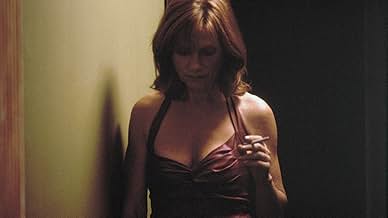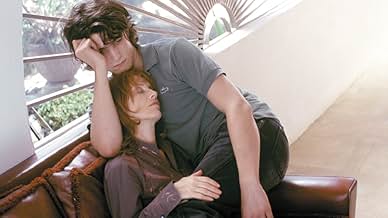When his father dies, a young man is introduced by his attractive, amoral mother to a world of hedonism and depravity.When his father dies, a young man is introduced by his attractive, amoral mother to a world of hedonism and depravity.When his father dies, a young man is introduced by his attractive, amoral mother to a world of hedonism and depravity.
- Awards
- 2 nominations
- Ian
- (as Théo Hakola)
- Le femme de ménage
- (as Sylvia Johnson)
- Director
- Writers
- All cast & crew
- Production, box office & more at IMDbPro
Storyline
Did you know
- Quotes
Hélène, the Mother: Your father is dead. I won't lie to you anymore. You must admit that I'm worse than him. I don't deserve your respect. What do you think I've been doing every afternoon all these years? Why were you raised by your grandmother? What did you imagine? Look at me, Pierre! I'm a bitch. A slut. No one respects me. Your father knew. He allowed it. If you really love me, then admit that I'm disgusting. I want you to love me for that. For the shame I inspire in you.
- ConnectionsReferenced in Caché (2005)
- SoundtracksAgnus Dei
Written by Samuel Barber
Performed by New College Choir Oxford (as Choir of New College Oxford)
The eternally enigmatic red-head expends her gifts this time upon the role of Helene, a "free-spirited" woman living in the Canary Islands with her husband, a paralytically repressed fellow identified only as The Father (Phillipe Duclos, comically freakish). The story begins with the arrival of Helene's son Pierre (Louis Garrell, vaguely psychotic) to the island villa; Pierre has just gotten out of boarding school, and seems less-than-enthused about being reunited with his parents, whose relationship is not what you would call warm. A few awkward scenes hence The Father dies (off-screen, the film's sole concession to good taste), leaving Helene and Pierre less-than-aggrieved; in fact they could care less about the expiration of the late, lamented The Father, who was nothing but a gog-eyed, mawkish drag with a study full of porno. Helene, a dedicated hedonist, decides to indoctrinate Pierre, a confused young man caught between his budding desires and his faith, into the ways of carnal pleasure. She introduces him to her friend Rea (Joana Preiss), a naughty girl who makes out with his mother in front of him, and talks without apparent embarrassment about licking out his poop-chute. This proves that Rea is a wild chick. Pierre is smitten by her enough to engage in public intercourse with her, but some deep well of guilt or something causes him to go a little cuckoo after their encounter; he winds up in the desert some place, posing in the sand like a Pasolini character and wailing about God. It's actually sort of fascinating, watching the movie degenerate from normal stupidity into the extraordinary kind. At first it's only annoyingly cryptic, the way the characters never have normal conversations with each other, and seldom behave in a recognizably human manner, then the scene in the back of the car happens, when Rea sticks her finger up Pierre's butt so everyone can smell it, and after that it's a quick descent into mindless pseudo-profundity masquerading as envelope-pushing cinema.
The film earns a spot in the bad-art-film hall-of-fame alongside such high-toned stinkers as Pola X, Skolimowski's The Shout and Peter Weir's unconscionably over-rated Picnic at Hanging Rock. The above-listed films, and Ma Mere, share in common a certain symbolist pretension, the tendency to reach for big philosophical effects at the expense of naturalism, or even basic psychological or behavioral credibility. Ma Mere, to put it simply, fails the smell-test. There isn't a moment in the film that rings true, a character that seems patterned after any human being that ever lived, an idea that doesn't seem hopelessly muddled. Honore has gone at his story, culled from a novel by Georges Bataille, from the top down, not bothering with the emotions, the psychic turmoil at the heart of the characters' inscrutable actions, but going straight for Big Ideas about sex, death, pain, God and all those other juicy things. Like Picnic at Hanging Rock it is a film over-burdened with portent, and one so unconvincing on a basic human level that its higher ambitions fail to resonate, leaving it seeming stilted and hollow. Unlike Picnic at Hanging Rock, Honore's film provides us no imagist thrills, no suspense, nothing to distract us from our nagging boredom at the director's finger-twiddling. Honore has no particular tonal command, no way with images, nothing to rescue him from his own bad ideas. He's hopeless with actors, even managing to make Isabelle Huppert seem clueless. Idea-wise he seems non-committal, unable to decide if hedonism is bad for people, or good for them, if his characters are doomed or merely floundering. His spatial sense is inconsistent; he wants to be edgy and spontaneous at one moment, then wants to be more formal and mannered, and sometimes lapses into a bad impersonation of Pasolini's sun-baked savagery, the sense of huge physical and philosophical spaces. None of it works.
- aliasanythingyouwant
- Jan 11, 2006
- Permalink
- How long is Ma mère?Powered by Alexa
Details
- Release date
- Countries of origin
- Official site
- Languages
- Also known as
- My Mother
- Filming locations
- Production companies
- See more company credits at IMDbPro
Box office
- Gross US & Canada
- $71,616
- Opening weekend US & Canada
- $10,334
- May 15, 2005
- Gross worldwide
- $1,510,052
- Runtime1 hour 50 minutes
- Color
- Sound mix
- Aspect ratio
- 1.66 : 1
Contribute to this page


























